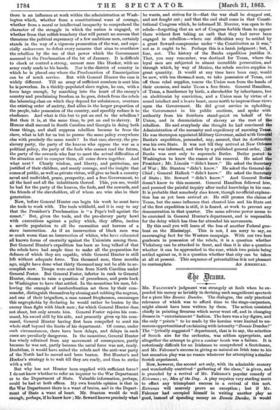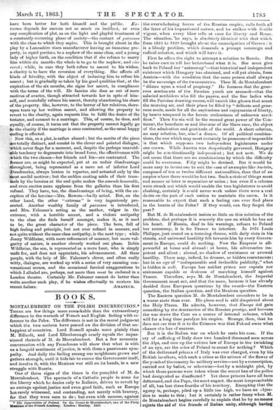grama.
MR. FALCONER'S judgment was strangely at fault when he ex- pended his money so lavishly in devising such magnificent spectacle for a piece like Bonnie Dundee. The dialogue, the only practical relevance of which was to afford time to the stage-carpenters, might almost have been written by them. The action consisted chiefly in pointing firearms which never went off, and in changing dresses in " entertainment " fashion. The hero was a lay-figure, and the only " points " to be made by the heroine were limited to nu- merous opportunities of exclaiming with intensity "Bonnie Dundee !" The "lyrically suggested" department, that is to say, the selection of Scotch airs for the orchestra, was seldom appropriate, and altogether the attempt to give a coukur locale was a failure. It is notoriously difficult for an Irishman to comprehend a Scotchman, and Mr. Falconer's success in giving so natural an Irish tone to his last sensation play was no reason whatever for attempting a pimilar Scotch experiment.
Now, however, the second set only, with its admirable scenery and wonderfully contrived" gathering of the clans," is given, and is preceded by a revival of Mr. Falconer's popular comedy of Extremes ; or, Men of the Day. A play requires very sterling merit to effect any triumphant success in a revival of this sort. Extremes will scarcely prove an exception ; but if Mr. Falconer had occupied himself in writing another play as good, instead of spending money on Bonnie Dundee, it would
have been better for both himself and the public. Ex- tremes depends for success not so much on incident, or even any complication of plot, as on the light and playful treatment of a constantly-recurring phase of society—the contact of parvenus with the class to which they aspire. This is brought about in the play by a Lancashire risen manufacturer leaving an immense pro- perty, in equal portions, to a nephew of the same class, and a young lady of higher birth, on the condition that if she refuses to marry him within six months the whole is to go to the nephew, and vice verA ; while, in case they both refuse to assent to his wishes, a charity is to have the reversion of everything. She affects all kinds of frivolity, with the object of inducing him to refuse his assent; but is gradually so taken by his good qualities that, at the expiration of the six months, she signs her assent, in compliance with the terms of the will. He fancies she does so out of mere motives of avarice, though attracted towards her in spite of him- self, and scornfully refuses his assent, thereby abandoning his share of the property. She, however, to the horror of her relatives, there- upon tears up her written assent, and allowing the property to revert to the charity, again requests him to fulfil the desire of the testator, and consent to a marriage. This, of course, he does, and equally, of course, it turns out that the property cannot legally go to the charity if the marriage is once contracted, so the usual happy ending is effected.
Now this, as a plot, is rather absurd ; but the merits of the piece are totally distinct, and consist in the clever and pointed dialogue, which never flags for a moment, and, despite the perhaps unavoid- able tendency to degenerate into broad farce, the effectiveness with which the two classes—her friends and his—are contrasted. The former are, as might be expected, put at an unfair disadvantage throughout, being represented as a mere set of inferior Lord Dundrearies, always beaten in repartee, and actuated only by the most sordid motives; but the sudden casting aside of their tram- mels by the heroine at the end quite makes the amende honorable, and even excites more applause from the galleries than his first refusal. They have, too, the disadvantage of being, with the ex- ception of the heroine—Mrs. Bowers—badly acted. But, on the other hand, the other "extreme" is very ingeniously pre- sented. Another wealthy family of parvenus is introduced, and Mrs. Falconer's acting as the mother, vulgar in the extreme, with a horrible accent, and a violent antipathy to the class she finds herself amongst, makes it, as it used to be, the great character of the piece. The hero, full of high feeling and principle, but not over refined in manner, and slot quite without the same class antipathy, is the next type ; while Jenny Wildbriax, with more refinement of manner, but more vul- garity of nature, is another cleverly worked out phase. Robin Wildbriar, the son, is represented as a mere boor, who is simply -unfit for, and does not appreciate, his advancement. All these people, with the help of Mr. Falconer's clever, and often really witty, dialogue, are worked up with a series of very amusing con- versational scenes, and the occasional farcical exaggerations to which I alluded are, perhaps, not more than must be endured in a London theatre. Certainly Mr. Falconer cannot do better than write another such play, if be wishes effectually to retrieve his































 Previous page
Previous page